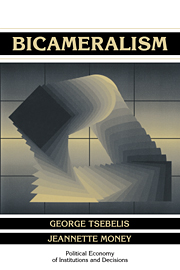Book contents
- Frontmatter
- Contents
- List of tables and figures
- Series editors' preface
- Acknowledgments
- Introduction
- PART I THE HISTORY AND GEOGRAPHY OF BICAMERAL DIVERSITY
- PART II MODELS OF BICAMERAL INSTITUTIONS
- PART III EMPIRICAL STUDIES OF BICAMERALISM AND IMPLICATIONS
- Introduction to Part III
- 6 The outcomes of intercameral bargaining
- 7 The process of intercameral bargaining
- 8 Conference committees
- 9 Implications
- Conclusions
- References
- Index
6 - The outcomes of intercameral bargaining
Published online by Cambridge University Press: 02 December 2009
- Frontmatter
- Contents
- List of tables and figures
- Series editors' preface
- Acknowledgments
- Introduction
- PART I THE HISTORY AND GEOGRAPHY OF BICAMERAL DIVERSITY
- PART II MODELS OF BICAMERAL INSTITUTIONS
- PART III EMPIRICAL STUDIES OF BICAMERALISM AND IMPLICATIONS
- Introduction to Part III
- 6 The outcomes of intercameral bargaining
- 7 The process of intercameral bargaining
- 8 Conference committees
- 9 Implications
- Conclusions
- References
- Index
Summary
This chapter is designed to test the model developed in Chapter 4. Consequently, we retain the assumption that bicameral negotiations are driven by impatience to reach agreement. We operationalize impatience in terms of the strength and breadth of the governing political coalition. The reader should suspend judgment about the adequacy of our choice until the following chapter, where we take time to examine the impatience assumption critically.
The complete information model developed in Chapter 4 connects different institutional features of the navette system with outcomes. The incomplete information model of Chapter 4 predicts that under conditions of one-sided incomplete information, the number of negotiating rounds in bicameral legislatures increases with one house's uncertainty about the other house's impatience (time discount factor). In more common political terminology, relations between the chambers should be more acrimonious under conditions of uncertainty; it will take longer for the two houses to reach agreement.
We test these predictions with data from the French legislature under the Fifth Republic. France represents a natural test of the model of one sided incomplete information because the composition of the Senate remained relatively constant while the composition of the National Assembly varied widely – from a Gaullist to a Socialist majority, by way of a centrist–Gaullist coalition. We argue first that the composition of the National Assembly affects the impatience of that legislative body to reach agreement. We argue second that the changing composition of the National Assembly introduces uncertainty about the impatience of the legislative body in a nonlinear fashion.
- Type
- Chapter
- Information
- Bicameralism , pp. 127 - 144Publisher: Cambridge University PressPrint publication year: 1997

